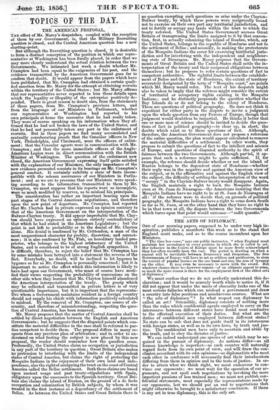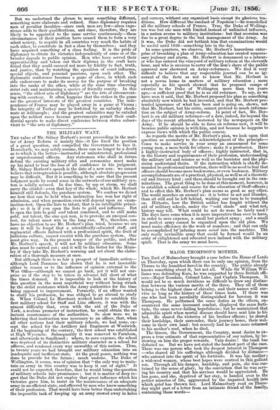THE ARTS OF DIPLOMACY.
ONE of our morning papers supposed to be under very high in- spiration, publishes a manifesto this week as to the stand that England mu§t make, and as to the course incumbent upon her Ministers.
".The time has come," says our public instructer, "when England must maintain her ascendancy in every position in which she is called to act. Her influence in the Courts of Europe must be more freely acknowledged than has often recently been the case. The period is drawing on when a contest will be inevitable between Democracy and Despotism. The free Governments of Europe will have be act as arbiters and pacificators, to stein the torrent of popular licence on the one hand and stay the arm of tyranny on the other. It may even be necessary to move with the sword. But whatever chance there is—however remote—of an ultimate appeal to arras, so much the more reason is there for the employment first. of the ablest arts of diplomacy."
We must confess that we do not perfectly, understand this de- claration; and it would be scarcely worth while to notice it, if it did not appear that under the mists of obscurity lurks one of the most serious fallacies which can mislead a government and draw a country into false positions and mischievous courses. What are "the arts of diplomacy " ? In what respect can diplomacy be called an art? Ostensibly, diplomacy consists of nothing more than the rules which confidential agents employed to carry on the intercourse between different states have found most conducive to the effectual execution of their duties. But what are the duties of confidential men employed between different states? No state can be safe that does not guide itself in its intercourse with foreign states, as well as in its own laws, by truth and jus- tice. The confidential men have only to ascertain and abide by the truth, and to obey the dictates of jjustice.We can indeed understand one species of art which may be ac- quired in the pursuit of diplomacy. As nations differ—as all human knowledge is imperfect—as each country will naturally regard facts from its own point of view, and will draw the con- elusion accordant with its own opinions—so diplomatists who meet each other in conference will necessarily find their interlocutors differing from them in opinion and in the testa of justice. In or- der to attain what we think right, we must endeavour to con- vince our opponents ; we must wait for the operation of our ar- guments, and not spoil such negotiations by invoking the more impatient passions of less trained men ; we must not publish con- fidential statements, most especially the representations made by our opponents, lest we should put an end to negotiations that might otherwise be brought to a satisfactory conclusion. If there IS any art in true diplomacy, this is the only art. But we undert,and the phrase to mean something different, something more elaborate and refined. Since diplomacy requires men of peculiar faculties—since such men are few—since expe- rience adds to their qualifications, and since, therefore, they are lady to be appointed to the same service continuously—these circumstances of their position have caused them to form a very select society, to acquire in all countries very much the habits of each other, to constitute in fact a class byth themselves; and they have acquired something of a class feeling. It is the pride of diplomacy to obtain its victories independently of arms or of the broader appeals to public opinion. Men who have served their apprenticeship and taken out their diploma in the craft have found that they could succeed not more by fidelity to fact, truth, and justice than by watching the operation of court influence, special objects, and personal passions, upon each other. The diplomatic conference becomes a game of chess, in which each side endeavours to make its moves for the purpose of breaking into the ranks of the other, while at the same time observing strict rule and maintaining a species of friendly comity. In this sense, "the ablest arts of diplomacy" are the arts of circumvent- ing with courtesy. It often happens that the stakes in the Fame are the greatest interests of the greatest countries. The inde- pendence of France may be played away in a game at Vienna ; the integrity of Turkey may be forfeited by an unlucky check- mate at Adrianople ; and the greatest calamities may be entailed upon the noblest races because governments permit their confi- dential agents to make direct conference between states subser- vient to the arts of diplomacy."



























 Previous page
Previous page